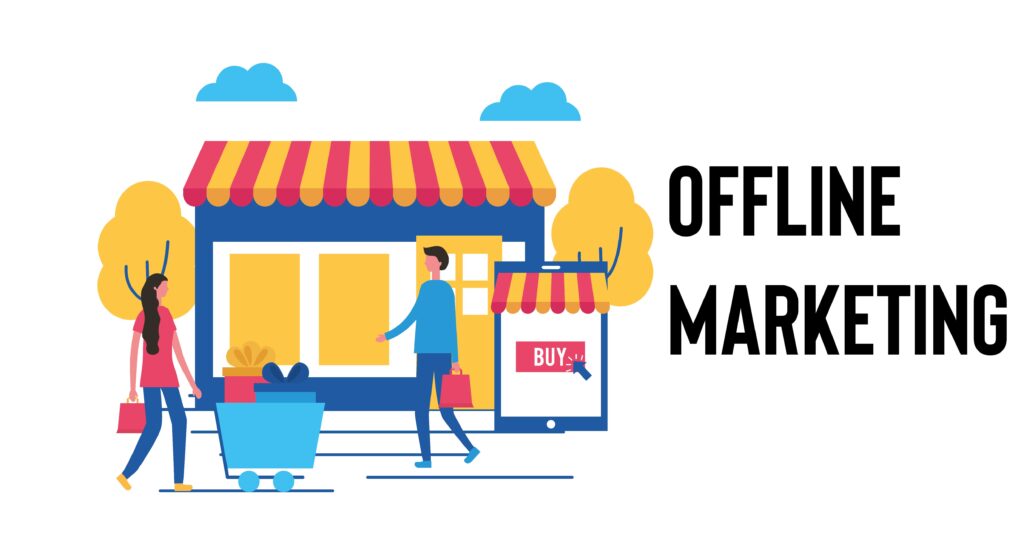The Power of Offline Marketing in a Digital World
In today’s digital age, where online marketing dominates the business landscape, it’s easy to overlook the power of offline marketing strategies. While digital marketing has revolutionized the way businesses reach their target audience, offline marketing still holds significant value. In this article, we will explore the importance of offline marketing in a digital world and discuss effective strategies that can boost your brand’s visibility and customer engagement.
Outline of the Article
- Introduction
- The Rise of Digital Marketing
- The Importance of Offline Marketing
- 3.1: Building Brand Awareness
- 3.2: Targeting Local Customers
- 3.3: Tangible Marketing Collateral
- Offline Marketing Strategies
- 4.1: Direct Mail Marketing
- 4.2: Networking Events
- 4.3: Print Advertising
- 4.4: Billboards and Outdoor Ads
- Integrating Offline and Online Marketing
- The Power of Word-of-Mouth Marketing
- Measuring the Effectiveness of Offline Marketing
- Conclusion
- FAQs
1. Introduction
In a world consumed by digital platforms and online interactions, offline marketing stands out as a valuable tool to connect with consumers in more tangible and personal ways. While digital marketing offers numerous advantages, such as precise targeting and real-time analytics, offline marketing can provide unique benefits that complement online efforts.
2. The Rise of Digital Marketing
The rise of digital marketing has been nothing short of revolutionary. With the advent of social media, search engine optimization, and online advertising platforms, businesses now have powerful tools to target specific audiences and measure the effectiveness of their campaigns. Digital marketing allows for unprecedented reach and precision, enabling businesses to connect with potential customers on a global scale.
3. The Importance of Offline Marketing
Despite the dominance of digital marketing, offline strategies still play a crucial role in building brand awareness and establishing meaningful connections with customers. Let’s explore the reasons why offline marketing remains relevant in a digital world:
3.1 Building Brand Awareness
Offline marketing provides unique opportunities to build brand awareness among local communities. By engaging in offline activities such as sponsorships, partnerships with local events, or participating in community initiatives, businesses can create a strong presence and gain the trust and loyalty of local customers.
3.2 Targeting Local Customers
While online marketing allows businesses to reach a global audience, offline marketing excels at targeting local customers. Local newspapers, radio stations, and physical signage can effectively capture the attention of individuals within a specific geographic area. This targeted approach can be particularly beneficial for small businesses that rely on local customer support.
3.3 Tangible Marketing Collateral
Unlike digital marketing, offline strategies provide tangible marketing collateral that customers can physically interact with. Brochures, flyers, business cards, and promotional items can leave a lasting impression and serve as a reminder of your brand long after the initial encounter. These physical touchpoints can significantly contribute to brand recognition and customer retention.
4. Offline Marketing Strategies
Now that we understand the importance of offline marketing, let’s explore some effective strategies that businesses can employ:
4.1 Direct Mail Marketing
Direct mail marketing involves sending targeted promotional materials, such as postcards or catalogs, directly to potential customers’ mailboxes. This approach allows businesses to reach individuals who may not be active online or prefer physical advertisements. Personalization and creativity are key to ensuring the success of direct mail campaigns.
4.2 Networking Events
Networking events provide a valuable opportunity for businesses to connect with potential customers, partners, and industry influencers. By attending trade shows, conferences, and seminars, you can engage in face-to-face interactions, showcase your products or services, and establish meaningful connections that can lead to long-term business relationships.
4.3 Print Advertising
Print advertising in newspapers, magazines, and local publications can still be an effective way to reach a specific target audience. Well-designed print ads with compelling visuals and persuasive copy can capture readers’ attention and drive them to take action. It’s important to carefully select publications that align with your target market to maximize the impact of your print advertising efforts.
4.4 Billboards and Outdoor Ads
Billboards and outdoor advertisements offer a larger-than-life presence that can’t be ignored. Placing strategically located billboards or signage in high-traffic areas can generate brand awareness and capture the attention of potential customers. These offline marketing assets can create a lasting impact on individuals who regularly pass by or commute through those areas.
5. Integrating Offline and Online Marketing
To maximize the effectiveness of your marketing efforts, it’s essential to integrate offline and online strategies seamlessly. For example, you can use QR codes on your print materials that direct customers to your website or social media profiles. This integration allows you to track the effectiveness of your offline campaigns and capture valuable data for future marketing endeavors.
6. The Power of Word-of-Mouth Marketing
Word-of-mouth marketing remains one of the most powerful forms of advertising. Offline interactions and positive experiences with your brand can lead satisfied customers to share their experiences with friends, family, and colleagues. Encouraging customer reviews and testimonials, as well as implementing referral programs, can amplify the impact of word-of-mouth marketing and boost your brand’s reputation.
7. Measuring the Effectiveness of Offline Marketing
While measuring the impact of offline marketing can be challenging compared to online campaigns, there are methods to evaluate its effectiveness. For example, using unique discount codes or tracking phone numbers in offline advertisements can help track conversions. Additionally, conducting customer surveys or asking new customers how they heard about your business can provide valuable insights into the success of your offline marketing initiatives.
8. Conclusion
In a digital world dominated by online marketing, offline strategies still hold significant power in establishing strong brand connections, targeting local customers, and leaving lasting impressions. By integrating offline and online marketing efforts, businesses can create a holistic approach that maximizes their reach and engages customers through various channels. Don’t underestimate the power of offline marketing in building brand awareness, driving customer loyalty, and ultimately achieving business success.
9. FAQs
Q1. Are offline marketing strategies still relevant in today's digital age?
Absolutely! While digital marketing is essential, offline strategies provide unique benefits such as tangible touchpoints, local targeting, and personal interactions that can significantly impact brand awareness and customer engagement.
Q2. How can I measure the effectiveness of my offline marketing campaigns?
Tracking methods like unique discount codes, tracking phone numbers, and customer surveys can help measure conversions and gather feedback to evaluate the success of your offline marketing efforts.
Q3. Can offline and online marketing be integrated?
Yes, integrating offline and online marketing is crucial for a comprehensive marketing strategy. Utilize QR codes, personalized URLs, or specific landing pages to bridge the gap between offline and online experiences.
Q4. What role does word-of-mouth marketing play in offline strategies?
Word-of-mouth marketing is incredibly powerful. Satisfied customers sharing their positive experiences with others can significantly boost brand reputation and attract new customers.
Q5. How can small businesses benefit from offline marketing?
Small businesses can leverage offline marketing to target local customers, build strong community connections, and establish a physical presence. Offline marketing allows them to compete effectively within their local market and generate customer loyalty through personal interactions and tangible marketing collateral.

